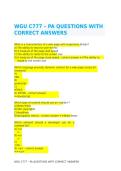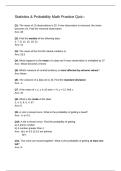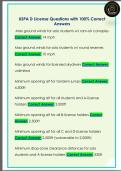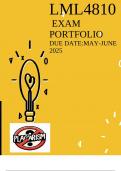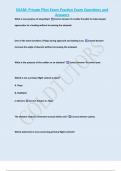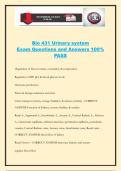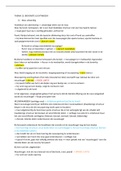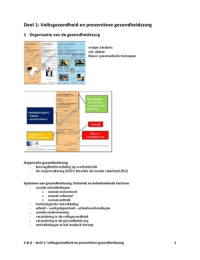English Revolution Last min revision
,The Emergence of conflict and the end of Consensus, 1625-1629
The Legacy of James I
- James Management of religious issues and divisions: Religious problems were the most serious
challenge during the reign Of James I; fear of Catholicism threatened social stability, this was
reflected in souring political relations between Crown and Parliament which revolved around
religious issues. Growing religious extremism threatened James in many ways, his reign was
characterised by reactive measures to deal with multiple religious crises e.g. The Gun powder plot
of 1605 in which Guy Fawkes almost blew up Parliament led to (increased recusancy fines, Catholics
being removed from government posts, Catholics had to affirm a new oath of allegiance in 1606 and
the public fear of Catholicism grew stronger), 30 years war that broke out in 1618 (James sought to
seek a political solution to the mess created by his son in law Frederick, by pressing Spain to accept
his mediation and maintaining a pursuit of a Spanish match for his son, if this failed he hoped to join
the French as catholic but anti Hapsburg as he believed that they could sue for peace together,
however this policy made English people worry that he was flirting with a return to Catholicism) ,
Issue of episcopacy (Led to the Hampton court conference in January 1604 in which James stated
‘No Bishop, No king’), Revival of 1604 Book of common prayer in England + Ireland but showed
considerable flexibility within Scottish churches.
- Relations Between Crown and Parliament : Political issues threatened James, but to a limited extent
as he remained in control of his Parliament, the one time Parliament behaved radically in a
manoeuvre that could have seriously undermined the Crown, it was done for religious not political
purposes e.g. English Parliament different to Scottish one (James found it to be argumentative with
a growing sense of its institutional independence he was also limited in his ability to place
supporters in the common and influence local elections), Petition of 1621 asked James to visibly
support the Protestant cause in the 30 years war and recommended that a Spanish marriage for
Charles should be replaced with a protestant match this led to a long speech by James ‘ Do not
attempt to reduce our prerogative or we will certainly remove your privileges’ , Parliament
galvanised into action and drew up a lengthy document a ‘Protestation’ this is one of the key
constitutional documents that defined Parliaments understanding of its relationship with crown
(James tore out the protestation out of the Commons journal and dissolved Parliament)., Financial
issues strained relations between Crown and Parliament (James faced multiple financial problems
such as the debt from Elizabeth, his larger household and war with Spain , Failure of Great contract,
In financial need , James called a new Parliament in 1614 but swiftly dissolved it as it was too
fractious and unyielding leading James to govern without Parliament from 1614-1621) – J failure of
great contract was a religious one due to divine right
- Relations with Foreign powers: James saw a role for himself as ‘Rex pacificus’ the bringer of peace
through diplomacy however this came to nothing and left Charles a mixed legacy e.g. James efforts
to maintain a balanced foreign policy ( 1604 Treaty of London ended war with Spain, 1609 Alliance
with France during Julich Cleves succession Crisis was pro France and anti spain, 1612 Alliance with
German Protestant union was anti catholic, 1613 Marriage of daughter Elizabeth to Elector
Frederick V of the Palatinate was pro protestant and German union, 1613-1619/1622-23 Pursuit of
Spanish Princess for son Prince Charles), James I failure of foreign policy (A misguided dash to Spain
in 1623 by Buckingham and Prince Charles ended in their personal humiliation and the collapse of
all hopes of a Spanish match, Buckingham next drove forward a pro French anti Spanish policy
including a new marriage with French Henrietta Maria, yet Louis XIII’s chief cardinal Richelieu to
offer James little in return and specifically no immediate commitment to a joint campaign against
the Hapsburgs)
Monarchy and the divine right
- The Character and aims of Charles I : Charles personality ensured relations would inevitably
deteriorate between Crown and Parliament, his belief in the Divine Right not only caused him to
promote Arminianism which caused fears of a popish plot but also did not bode well with his
, inability to tolerate debate making him appear absolutist e.g. As an adult Charles was unable to
shake his Scottish accent which made him feel rather ill at ease among the polished Englishmen of
the Royal court, He was very short and he had a stutter meaning he liked the long rambling
conversations with courtiers and politicians which had been so much a part of James effective
governing style, His reign was characterised by the relationships with specific individuals including
his wife Henrietta Maria and his trusted companions most notably Buckingham, Laud and
Wentworth, Charles aims (maintain law and order, defend against external threats, provide effective
religious leadership, ensure financial/ economic wellbeing), While James I had developed a
powerful theory of Divine Right but often moderated it in Practice Charles I rigidly adhered to his
perceived status as the ruler chosen by God
- The Queen and the court : The atmosphere in the Queen’s court caused increased religious tension
due to her power awarded to her as Queen and her being a Catholic e.g. With Buckingham dead in
1628 Henrietta Maria and Charles rapidly grew closer (This catalysed the transformation of her
status and power), Arrival od French ambassador helped her consolidate her position because the
Marquis de Chateauneuf was a shrewd political player sent with the express aim of training her to
develop political influence , A faction gathered around her (including the Earl of Holland and Wat
Montagu, which provided a pro French balance to the pro Spanish court assembling around William
Laud and Francis Cottington), The Queen prevailed on the Protestant Earl of Holland to discreetly
secure the freedom of a number of arrested priests in Early 1630’s
- The kings advisors : An unforeseen consequence of Charles’s drive to bring order and decency to his
court was therefore that it isolated him from those men who expected to become his natural
advisors and whose advice he would have found useful. More profoundly even after Buckingham’s
assassination Charles failed to revert to the functionality of his fathers earlier court and instead
continued to prioritise order over access e.g. By the time Charles became King Buckingham’s
influence had nearly destroyed the functionality of the ‘inner sanctum’ because he had effectively
replaced the king as the front of patronage and power and was distributing royal favour exclusively
among his own faction, the court Charles inherited was notoriously immoral, corrupted by
drunkenness and sexual immorality, Charles personal temperament was swiftly reflected as the
court rapidly reformed and became more moral and orderly, Buckingham initially continued to
dominate patronage , Charles instructed the gentry to spend less time in London and more time
fulfilling their duties in their regions (William Palmer was fine £1000 in the star chamber in 1632 for
remaining in London without Royal permission), Charles’s desire for physical forms of order and
decency was also a factor in cutting of access to his royal person.
- Ideas of Royal authority: While there is little to indicate that Charles was aiming to become an
absolute ruler in the model of his brother in law , Louis XIII his actions and those of his wife alarmed
an increasingly anxious nation e.g. Parliament Catholics and puritans opposed the divine right,
Charles responded to this opposition in a more subtle but inflexible way.
Challenges to the arbitrary government of Charles I
- Reactions against Financial policies : A king who is heavily indebted and predisposed to bypass
Parliament and a Parliament who as a result and due to their own conviction is more willing to part
with tradition, does not lead anywhere else but conflict e.g. Parliament broke with tradition by only
awarding Charles the right to collect Tonnage and Poundage for 1 year and 2 subsidies worth
£140,000 even though Charles needed 1 million pounds( Expressing mistrust in Charles foreign
Policy) even though this right was normally confirmed just once at the beginning of a new reign
allowing the monarch to collect it throughout the reign, Charles regarded the limited grant of
tonnage and poundage as a direct attack on his own divine right and ordered his tax collectors to
continue collecting it beyond the first year, The Forced Loan 1626 (All liable were summoned to
public meetings where they were individually pressed to pay, this public manner made refusal to
pay an open act of opposition), Opposition to forced loan (in 1627 Thomas Scot an MP for Kent
attacked Buckingham in print writing that subjects may disobey and refuse an unworthy kings
command) (Some judges refused to endorse legality of forced loan , for example chief justice Carew
was dismissed as a result) (The Archbishop of Canterbury was suspended for refusing to license a
, sermon by Robert Sib Thorpe which defended the forced loan) (The Five Knights Case 1627, King
ordered the imprisonment of 76 gentry who refused to pay, 5 of the 76 decided to force a
confrontation by issuing a writ of Habeas Corpus, Charles had no choice but to take them to trial,
creating a test case , the Judgement upheld Charles prerogative to imprison without trial those who
refused to pay this particular loan)
- Reasons for and Outcomes of conflict over the Church : Religious issues were pervasive , they did
not exist entirely externally and were catalysed by the Kings own religious belief in the divine right
which explains much of his behaviour which angered the protestant nature and the Parliament
which represented it e.g. By the 1620s ministers who adhered to the strand of Arminianism were
beginning to rise into influential positions this was a problem because some thought that
Arminianism was part of a sinister plot to undermine the Church of England and return to Roman
Catholicism (The ideological position of Armenians that god allowed each person to make a free
choice in their earthly lives so that all could be saved, but not all might choose to be saved looked
similar to catholic belief that God chose everyone to be saved but people have free will and can
choose not to be saved if they wish : Catholic doctrine differs substantially from protestant doctrine
in other areas such as the role of Holy communion), Arminian ideas appeared to Charles because
they valued order, ceremony and hierarchy which chimed with his ideas about Divine Right and
dignity leading him to promote the rise of Armenians into Key church roles, York House conference
February 1626 in Buckingham’s London home ( Conference initially focused on the writings of
Richard Montague who had generated controversy for an old gag for a new goose written in 1624,
but its debates then stretched into a theological debate on predestination, it ended inconclusively
but did serve to help define a distinctive Arminian grouping within the Anglican Church), Parliament
had attempted to bring Montagu to trial in 1635 and renewed attack in 1626 by passing a resolution
in April which led to his arrest, By perusing Montagu Parliament was directly challenging a
clergyman and doctrine that had the support of the King and this was a key reason that Charles
dissolved the Parliament in the Summer.
- Reactions against foreign Policy and the role of Buckingham : The foreign policy that Buckingham
oversaw was an absolute failure which not only brought embarrassment to the nation but financial
strain which caused deteriorating relations between crown and Parliament, that being said
Buckingham was often scapegoated for mishaps and Charles as Sovereign should bare ultimate
responsibility for foreign policy failures and the actions of his advisors e.g. The Cadiz expedition
September 1625 was an expensive failure that was blamed on Buckingham who was Lord High
Admiral (Intended to open a war on a second front to distract the Spanish away from the platinate,
But the English failed to capture the port or any Spanish treasure ships stationed there, most
soldiers rendered themselves useless by getting hideously d4runk on Spanish wine, this infuriated
Parliament), Charles needed finance so recalled Parliament in February in order to go ahead with
Buckingham’s plan to remove Richelieu from power who was using English loaned ships to attack
protestants, the 1626 Parliament launched impeachment proceedings against Buckingham in May
resulting in the imprisonment of Elliot and Digges (In order to stop Buckingham’s impeachment,
Charles implied a threat to Parliaments future existence in a statement and then dissolved
Parliament), La Rochelle Raids 1627-1628( when Buckingham’s forces landed in Rhe a direct assault
failed because the English scaling ladders were to short), During the years 1624-1628 50,000 men
served under Buckingham and 1/3 had died , All Charles funds had been spent and he had to recall
Parliament in 1638.
Parliamentary Radicalism
- Personalities and policies of Parliamentary opposition to the King : Whilst Parliament could have
certainly have been more traditional and not unnecessarily broken convention, their direct action
was not radical and their frustration with the King stemming from increasing their increasing
intolerance of Catholicism was reflected by the Public e.g. Parliament of the 1620s were packed
with highly competent men mainly lawyers (John Pym 1584-1643, Opposed Buckingham’s foreign
policy , helped impeach Buckingham and support the Petition of Right in 1628, Sir Edward Coke
1552-1634, hugely experienced Lawyer who opposed James I’s articulation of divine right , he had
, helped draft the protestation of 1621, he drafted the 1628 petition of right as his last act before
retiring), Charles recalled Parliament in March 1628 because he was in dire need of money to fund
his foreign policy ( As an indication of goodwill the commons offered 5 subsidies and a grant of
tonnage poundage rapidly addressing Charles financial needs in return they expected that the king
should consider their grievances) Their grievances were (Extra Parliamentary taxation , Billeting,
Martial law in certain counties and Habeas Corpus )
- The petition of Right : The Petition of Right was intended to demonstrate that King and Parliament
shared a common understanding of the laws and customs of England when in fact it had served to
heighten Parliamentary fears that this particular King could not be trusted e.g. Asked to confirm 4
ancient liberties (1. Subjects should be taxed only by parliamentary consent, 2. subjects could be
imprisoned only if just cause was demonstrated in court 3. The imposition of billeting was illegal, 4.
The imposition of martial law on the civilian population was illegal), Charles accepted petition on 7
June 1628 but he did so without using specific terminology which would have made it legally
binding, Commons had to insist for Charles to finally give legal assent to the Petition.
- The Dissolution of Parliament and Charles I’s commitment to Personal Rule e.g. On 23 August 1628
Buckingham was stabbed to death in Portsmouth this had many consequences (Charles held
parliament responsible because Felton said at his trial he was inspired to action by Junes
Remonstrance, Charles and Henrietta Maria grew closer, Charles alienated from his subjects,
Buckingham could no longer be used as a scapegoat) , Charles recalled Parliament on 20 January
1629 and two main issues that had not been addressed in Petition of Right dominated ( Tonnage
and Poundage , Religion specifically promotion of William Laud and Richard Montague to key
bishoprics), Trust eroded with shocking news that the King had instructed the royal printer to
include both his constitutional and non-constitutional assents to the printed version of the Petition
of Right and obscure the statue number so that it was not adequately visible in the printed record
making the legal authority of the document more ambiguous, Black Rod was sent to suspend
Parliament , the Speaker pinned down, Sir John Elliot called out his three resolutions which when
passed became known as the protestation of 1629 (about tonnage and poundage and religious
innovation)
An Experiment in Absolutism 1629-1640
Charles I’s Personal Rule
- Charles I’s Chief ministers : When Charles Dissolved parliament he was not acting radically, he was
merely exerting his right as king thus he did not have to invent a new way of governing without
Parliament because Parliament was only one of the instruments of government at his disposal;
Charles ruled without Parliament but not without advisors though this would prove to be
detrimental to his royal authority e.g. By temperament Charles preferred to deal with a few close
loyal allies this coupled with the absence of Parliament meant that political influence became
concentrated in an elite group which alienated many in the broader political nation, Francis Lord
Cottington was chancellor of the exchequer 1629-1649 and Master of the Court of Wards 1635-40,
Henry Montagu was Keeper of the Privy seal (1628-1640), William Laud was first Lord of the
Treasury 1635-1640 and Archbishop of Canterbury, Thomas Wentworth was Lord deputy of Ireland
(1632-1640), Privy council consisted of 35 members drawn from noble families, Two factors
mitigated against the effectiveness of the Council in the 1630s (1. Charles attended the twice weekly
council only a handful of occasions for example between June 1630-June 1631 the King attended
only 3 times while Henry Montagu attended 89 sessions, 2. Charles allowed a group within the
council identified as the Spanish faction to gain significance influence this made it appear that
Charles was being steered in a pro Catholic direction)
- Methods of Government : Charles secured law and order through prerogative courts however his
system of government increasingly appeared absolutist with stringent new measures introduced
e.g. Star Chamber (could not hand down a death penalty but it could impose huge fines and
,The Emergence of conflict and the end of Consensus, 1625-1629
The Legacy of James I
- James Management of religious issues and divisions: Religious problems were the most serious
challenge during the reign Of James I; fear of Catholicism threatened social stability, this was
reflected in souring political relations between Crown and Parliament which revolved around
religious issues. Growing religious extremism threatened James in many ways, his reign was
characterised by reactive measures to deal with multiple religious crises e.g. The Gun powder plot
of 1605 in which Guy Fawkes almost blew up Parliament led to (increased recusancy fines, Catholics
being removed from government posts, Catholics had to affirm a new oath of allegiance in 1606 and
the public fear of Catholicism grew stronger), 30 years war that broke out in 1618 (James sought to
seek a political solution to the mess created by his son in law Frederick, by pressing Spain to accept
his mediation and maintaining a pursuit of a Spanish match for his son, if this failed he hoped to join
the French as catholic but anti Hapsburg as he believed that they could sue for peace together,
however this policy made English people worry that he was flirting with a return to Catholicism) ,
Issue of episcopacy (Led to the Hampton court conference in January 1604 in which James stated
‘No Bishop, No king’), Revival of 1604 Book of common prayer in England + Ireland but showed
considerable flexibility within Scottish churches.
- Relations Between Crown and Parliament : Political issues threatened James, but to a limited extent
as he remained in control of his Parliament, the one time Parliament behaved radically in a
manoeuvre that could have seriously undermined the Crown, it was done for religious not political
purposes e.g. English Parliament different to Scottish one (James found it to be argumentative with
a growing sense of its institutional independence he was also limited in his ability to place
supporters in the common and influence local elections), Petition of 1621 asked James to visibly
support the Protestant cause in the 30 years war and recommended that a Spanish marriage for
Charles should be replaced with a protestant match this led to a long speech by James ‘ Do not
attempt to reduce our prerogative or we will certainly remove your privileges’ , Parliament
galvanised into action and drew up a lengthy document a ‘Protestation’ this is one of the key
constitutional documents that defined Parliaments understanding of its relationship with crown
(James tore out the protestation out of the Commons journal and dissolved Parliament)., Financial
issues strained relations between Crown and Parliament (James faced multiple financial problems
such as the debt from Elizabeth, his larger household and war with Spain , Failure of Great contract,
In financial need , James called a new Parliament in 1614 but swiftly dissolved it as it was too
fractious and unyielding leading James to govern without Parliament from 1614-1621) – J failure of
great contract was a religious one due to divine right
- Relations with Foreign powers: James saw a role for himself as ‘Rex pacificus’ the bringer of peace
through diplomacy however this came to nothing and left Charles a mixed legacy e.g. James efforts
to maintain a balanced foreign policy ( 1604 Treaty of London ended war with Spain, 1609 Alliance
with France during Julich Cleves succession Crisis was pro France and anti spain, 1612 Alliance with
German Protestant union was anti catholic, 1613 Marriage of daughter Elizabeth to Elector
Frederick V of the Palatinate was pro protestant and German union, 1613-1619/1622-23 Pursuit of
Spanish Princess for son Prince Charles), James I failure of foreign policy (A misguided dash to Spain
in 1623 by Buckingham and Prince Charles ended in their personal humiliation and the collapse of
all hopes of a Spanish match, Buckingham next drove forward a pro French anti Spanish policy
including a new marriage with French Henrietta Maria, yet Louis XIII’s chief cardinal Richelieu to
offer James little in return and specifically no immediate commitment to a joint campaign against
the Hapsburgs)
Monarchy and the divine right
- The Character and aims of Charles I : Charles personality ensured relations would inevitably
deteriorate between Crown and Parliament, his belief in the Divine Right not only caused him to
promote Arminianism which caused fears of a popish plot but also did not bode well with his
, inability to tolerate debate making him appear absolutist e.g. As an adult Charles was unable to
shake his Scottish accent which made him feel rather ill at ease among the polished Englishmen of
the Royal court, He was very short and he had a stutter meaning he liked the long rambling
conversations with courtiers and politicians which had been so much a part of James effective
governing style, His reign was characterised by the relationships with specific individuals including
his wife Henrietta Maria and his trusted companions most notably Buckingham, Laud and
Wentworth, Charles aims (maintain law and order, defend against external threats, provide effective
religious leadership, ensure financial/ economic wellbeing), While James I had developed a
powerful theory of Divine Right but often moderated it in Practice Charles I rigidly adhered to his
perceived status as the ruler chosen by God
- The Queen and the court : The atmosphere in the Queen’s court caused increased religious tension
due to her power awarded to her as Queen and her being a Catholic e.g. With Buckingham dead in
1628 Henrietta Maria and Charles rapidly grew closer (This catalysed the transformation of her
status and power), Arrival od French ambassador helped her consolidate her position because the
Marquis de Chateauneuf was a shrewd political player sent with the express aim of training her to
develop political influence , A faction gathered around her (including the Earl of Holland and Wat
Montagu, which provided a pro French balance to the pro Spanish court assembling around William
Laud and Francis Cottington), The Queen prevailed on the Protestant Earl of Holland to discreetly
secure the freedom of a number of arrested priests in Early 1630’s
- The kings advisors : An unforeseen consequence of Charles’s drive to bring order and decency to his
court was therefore that it isolated him from those men who expected to become his natural
advisors and whose advice he would have found useful. More profoundly even after Buckingham’s
assassination Charles failed to revert to the functionality of his fathers earlier court and instead
continued to prioritise order over access e.g. By the time Charles became King Buckingham’s
influence had nearly destroyed the functionality of the ‘inner sanctum’ because he had effectively
replaced the king as the front of patronage and power and was distributing royal favour exclusively
among his own faction, the court Charles inherited was notoriously immoral, corrupted by
drunkenness and sexual immorality, Charles personal temperament was swiftly reflected as the
court rapidly reformed and became more moral and orderly, Buckingham initially continued to
dominate patronage , Charles instructed the gentry to spend less time in London and more time
fulfilling their duties in their regions (William Palmer was fine £1000 in the star chamber in 1632 for
remaining in London without Royal permission), Charles’s desire for physical forms of order and
decency was also a factor in cutting of access to his royal person.
- Ideas of Royal authority: While there is little to indicate that Charles was aiming to become an
absolute ruler in the model of his brother in law , Louis XIII his actions and those of his wife alarmed
an increasingly anxious nation e.g. Parliament Catholics and puritans opposed the divine right,
Charles responded to this opposition in a more subtle but inflexible way.
Challenges to the arbitrary government of Charles I
- Reactions against Financial policies : A king who is heavily indebted and predisposed to bypass
Parliament and a Parliament who as a result and due to their own conviction is more willing to part
with tradition, does not lead anywhere else but conflict e.g. Parliament broke with tradition by only
awarding Charles the right to collect Tonnage and Poundage for 1 year and 2 subsidies worth
£140,000 even though Charles needed 1 million pounds( Expressing mistrust in Charles foreign
Policy) even though this right was normally confirmed just once at the beginning of a new reign
allowing the monarch to collect it throughout the reign, Charles regarded the limited grant of
tonnage and poundage as a direct attack on his own divine right and ordered his tax collectors to
continue collecting it beyond the first year, The Forced Loan 1626 (All liable were summoned to
public meetings where they were individually pressed to pay, this public manner made refusal to
pay an open act of opposition), Opposition to forced loan (in 1627 Thomas Scot an MP for Kent
attacked Buckingham in print writing that subjects may disobey and refuse an unworthy kings
command) (Some judges refused to endorse legality of forced loan , for example chief justice Carew
was dismissed as a result) (The Archbishop of Canterbury was suspended for refusing to license a
, sermon by Robert Sib Thorpe which defended the forced loan) (The Five Knights Case 1627, King
ordered the imprisonment of 76 gentry who refused to pay, 5 of the 76 decided to force a
confrontation by issuing a writ of Habeas Corpus, Charles had no choice but to take them to trial,
creating a test case , the Judgement upheld Charles prerogative to imprison without trial those who
refused to pay this particular loan)
- Reasons for and Outcomes of conflict over the Church : Religious issues were pervasive , they did
not exist entirely externally and were catalysed by the Kings own religious belief in the divine right
which explains much of his behaviour which angered the protestant nature and the Parliament
which represented it e.g. By the 1620s ministers who adhered to the strand of Arminianism were
beginning to rise into influential positions this was a problem because some thought that
Arminianism was part of a sinister plot to undermine the Church of England and return to Roman
Catholicism (The ideological position of Armenians that god allowed each person to make a free
choice in their earthly lives so that all could be saved, but not all might choose to be saved looked
similar to catholic belief that God chose everyone to be saved but people have free will and can
choose not to be saved if they wish : Catholic doctrine differs substantially from protestant doctrine
in other areas such as the role of Holy communion), Arminian ideas appeared to Charles because
they valued order, ceremony and hierarchy which chimed with his ideas about Divine Right and
dignity leading him to promote the rise of Armenians into Key church roles, York House conference
February 1626 in Buckingham’s London home ( Conference initially focused on the writings of
Richard Montague who had generated controversy for an old gag for a new goose written in 1624,
but its debates then stretched into a theological debate on predestination, it ended inconclusively
but did serve to help define a distinctive Arminian grouping within the Anglican Church), Parliament
had attempted to bring Montagu to trial in 1635 and renewed attack in 1626 by passing a resolution
in April which led to his arrest, By perusing Montagu Parliament was directly challenging a
clergyman and doctrine that had the support of the King and this was a key reason that Charles
dissolved the Parliament in the Summer.
- Reactions against foreign Policy and the role of Buckingham : The foreign policy that Buckingham
oversaw was an absolute failure which not only brought embarrassment to the nation but financial
strain which caused deteriorating relations between crown and Parliament, that being said
Buckingham was often scapegoated for mishaps and Charles as Sovereign should bare ultimate
responsibility for foreign policy failures and the actions of his advisors e.g. The Cadiz expedition
September 1625 was an expensive failure that was blamed on Buckingham who was Lord High
Admiral (Intended to open a war on a second front to distract the Spanish away from the platinate,
But the English failed to capture the port or any Spanish treasure ships stationed there, most
soldiers rendered themselves useless by getting hideously d4runk on Spanish wine, this infuriated
Parliament), Charles needed finance so recalled Parliament in February in order to go ahead with
Buckingham’s plan to remove Richelieu from power who was using English loaned ships to attack
protestants, the 1626 Parliament launched impeachment proceedings against Buckingham in May
resulting in the imprisonment of Elliot and Digges (In order to stop Buckingham’s impeachment,
Charles implied a threat to Parliaments future existence in a statement and then dissolved
Parliament), La Rochelle Raids 1627-1628( when Buckingham’s forces landed in Rhe a direct assault
failed because the English scaling ladders were to short), During the years 1624-1628 50,000 men
served under Buckingham and 1/3 had died , All Charles funds had been spent and he had to recall
Parliament in 1638.
Parliamentary Radicalism
- Personalities and policies of Parliamentary opposition to the King : Whilst Parliament could have
certainly have been more traditional and not unnecessarily broken convention, their direct action
was not radical and their frustration with the King stemming from increasing their increasing
intolerance of Catholicism was reflected by the Public e.g. Parliament of the 1620s were packed
with highly competent men mainly lawyers (John Pym 1584-1643, Opposed Buckingham’s foreign
policy , helped impeach Buckingham and support the Petition of Right in 1628, Sir Edward Coke
1552-1634, hugely experienced Lawyer who opposed James I’s articulation of divine right , he had
, helped draft the protestation of 1621, he drafted the 1628 petition of right as his last act before
retiring), Charles recalled Parliament in March 1628 because he was in dire need of money to fund
his foreign policy ( As an indication of goodwill the commons offered 5 subsidies and a grant of
tonnage poundage rapidly addressing Charles financial needs in return they expected that the king
should consider their grievances) Their grievances were (Extra Parliamentary taxation , Billeting,
Martial law in certain counties and Habeas Corpus )
- The petition of Right : The Petition of Right was intended to demonstrate that King and Parliament
shared a common understanding of the laws and customs of England when in fact it had served to
heighten Parliamentary fears that this particular King could not be trusted e.g. Asked to confirm 4
ancient liberties (1. Subjects should be taxed only by parliamentary consent, 2. subjects could be
imprisoned only if just cause was demonstrated in court 3. The imposition of billeting was illegal, 4.
The imposition of martial law on the civilian population was illegal), Charles accepted petition on 7
June 1628 but he did so without using specific terminology which would have made it legally
binding, Commons had to insist for Charles to finally give legal assent to the Petition.
- The Dissolution of Parliament and Charles I’s commitment to Personal Rule e.g. On 23 August 1628
Buckingham was stabbed to death in Portsmouth this had many consequences (Charles held
parliament responsible because Felton said at his trial he was inspired to action by Junes
Remonstrance, Charles and Henrietta Maria grew closer, Charles alienated from his subjects,
Buckingham could no longer be used as a scapegoat) , Charles recalled Parliament on 20 January
1629 and two main issues that had not been addressed in Petition of Right dominated ( Tonnage
and Poundage , Religion specifically promotion of William Laud and Richard Montague to key
bishoprics), Trust eroded with shocking news that the King had instructed the royal printer to
include both his constitutional and non-constitutional assents to the printed version of the Petition
of Right and obscure the statue number so that it was not adequately visible in the printed record
making the legal authority of the document more ambiguous, Black Rod was sent to suspend
Parliament , the Speaker pinned down, Sir John Elliot called out his three resolutions which when
passed became known as the protestation of 1629 (about tonnage and poundage and religious
innovation)
An Experiment in Absolutism 1629-1640
Charles I’s Personal Rule
- Charles I’s Chief ministers : When Charles Dissolved parliament he was not acting radically, he was
merely exerting his right as king thus he did not have to invent a new way of governing without
Parliament because Parliament was only one of the instruments of government at his disposal;
Charles ruled without Parliament but not without advisors though this would prove to be
detrimental to his royal authority e.g. By temperament Charles preferred to deal with a few close
loyal allies this coupled with the absence of Parliament meant that political influence became
concentrated in an elite group which alienated many in the broader political nation, Francis Lord
Cottington was chancellor of the exchequer 1629-1649 and Master of the Court of Wards 1635-40,
Henry Montagu was Keeper of the Privy seal (1628-1640), William Laud was first Lord of the
Treasury 1635-1640 and Archbishop of Canterbury, Thomas Wentworth was Lord deputy of Ireland
(1632-1640), Privy council consisted of 35 members drawn from noble families, Two factors
mitigated against the effectiveness of the Council in the 1630s (1. Charles attended the twice weekly
council only a handful of occasions for example between June 1630-June 1631 the King attended
only 3 times while Henry Montagu attended 89 sessions, 2. Charles allowed a group within the
council identified as the Spanish faction to gain significance influence this made it appear that
Charles was being steered in a pro Catholic direction)
- Methods of Government : Charles secured law and order through prerogative courts however his
system of government increasingly appeared absolutist with stringent new measures introduced
e.g. Star Chamber (could not hand down a death penalty but it could impose huge fines and


